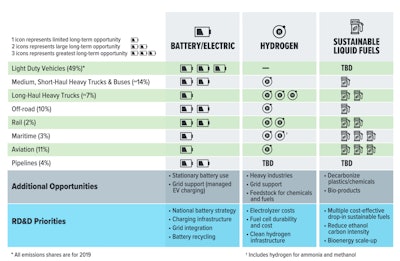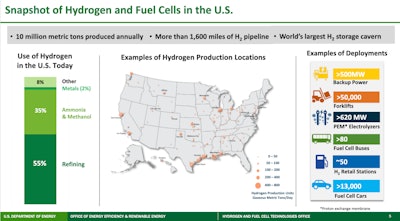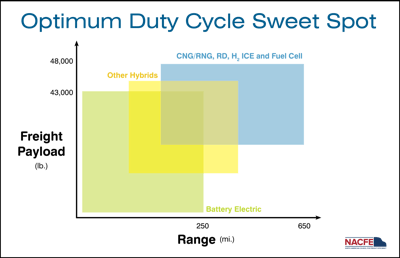
The North American Council for Freight Efficiency (NACFE) and RMI on Tuesday released a new Guidance Report, Hydrogen Trucks: Long Haul’s Future?, which focuses on hydrogen-based powertrains for heavy-duty Class 8 long-haul freight routes pulling van trailers. Electrification in trucking is still in its infancy – and hydrogen is embryonic – yet the study team determined that hydrogen fuel cell tractors are the only zero-emission solution for many duty cycles of heavy trucks.
"We don't really have a Mr. Fusion out there to go 600, 700 miles," said the report's key author and NACFE's Director of Emerging Technologies Rick Mihelic, "and as much as we appreciate battery-electric vehicles (BEVs), they really aren't set up to go those really long distances with heavy loads."
The report found that hydrogen may also be the forerunner of a new green industrial revolution, or just the progression from one fossil fuel-based energy carrier to another with greater emphasis on reducing emissions. Either way, hydrogen will be a factor in future long-distance freight hauling in combination with battery-electric vehicles for shorter range operations.
Mike Russell, Paccar senior project lead for zero-emissions powertrains, equated hydrogen to a gaseous battery, citing the key factor in going to a hydrogen fuel cell "is a fleet’s need for availability of the vehicle for multi-shift, multi-route operations."
NACFE's latest report is based on two previous NACFE reports — Viable Class 7/8 Electric, Hybrid and Alternative Fuel Tractors and Making Sense of Heavy-Duty Hydrogen Fuel Cell Tractors — which compared a range of alternative fuel heavy-duty truck technologies, including hydrogen.
Mihelic noted that while hydrogen is likely the winner for the long-haul segment, range-extending hydrogen and battery electric are not an “either/or" proposition, rather an “and” for the future of zero-emission freight.
“As we move to the zero-emissions freight future, in the long run, there are only two choices of power: battery electric and hydrogen fuel cell,” he said, adding that hydrogen is closely tied to electricity in that you can’t have hydrogen without significant amounts of electricity. "There's no divorcing electricity from hydrogen and that's something that often gets lost."
Alternative fuels like RNG, renewable diesel, and hydrogen used in internal combustion engines will be required to support the transition in the next two decades to help progress toward zero-emission goals, while in parallel ramping up the hydrogen and battery-electric infrastructure and manufacturing base – a period of time NACFE calls the messy middle.
NACFE Executive Mike Roeth added that "battery electrics are here, and they are going to come ahead of fuel cells," but the lessons learned from BEVs could potentially make the migration to hydrogen OTR far less painful. "We're going to learn a lot. Battery-electric trucks and getting the infrastructure to them have a head start (over hydrogen)."

A hydrogen infrastructure barely currently exists and the report notes that the acceleration of hydrogen fuel cell EVs is likely not about the vehicles or the fueling, rather the creation and distribution of the hydrogen itself. However, a hydrogen network buildout cannot be built solely on the backs of long-haul trucking, Mihelic said, as there is not enough scale for cost reduction, and the cost of hydrogen production, transportation, storage and dispensing will not be cost competitive with diesel without significant assistance from tax credits and other subsidies.
Scale, Mihelic said, would most easily come from industries and manufacturing processes that currently use natural gas, and allow transportation modes to "tap-off" from there.

from Overdrive https://ift.tt/u1d5ekH



Sourced by Quik DMV - CADMV fleet registration services. Renew your registration online in only 10 minutes. No DMV visits, no lines, no phone mazes, and no appointments needed. Visit Quik, Click, Pay & Print your registration from home or any local print shop.





0 comments:
Post a Comment